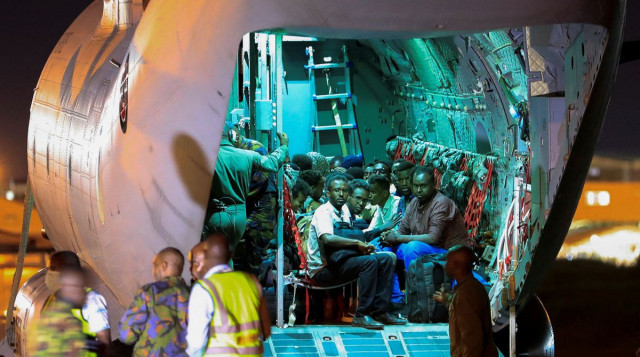Sudan's streets deserted as foreigners flee, lab seizure causes biohazard risk
WHO did not say which of the two sides - the army or the paramilitary Rapid Support Forces (RSF)- had captured the lab

Fighting in Sudan eased on Tuesday and more foreigners and locals fled the capital Khartoum, where marauding combatants created what a UN agency said was a "high risk of biological hazard" by seizing a laboratory.
The World Health Organization said one of the warring parties had taken control of a national health facility that stores measles and cholera pathogens for vaccinations, and ejected the technicians.
It gave few details and did not say which of the two sides - the army or the paramilitary Rapid Support Forces (RSF)- had captured the lab, which also contains a major blood bank.
An exodus of embassies and aid workers from Africa's third largest country has raised fears that civilians who remain will be in greater danger if an alternative to hostilities is not found before a three-day truce ends on Thursday.
Yassir Arman, a leading figure in a civilian political coalition, the Forces for Freedom and Change (FFC), urged humanitarian groups and the international community to help restore water and electricity, and send generators to hospitals.
"There are bodies scattered in streets and sick people who cannot find medicine, no water nor electricity. People should be allowed to bury their dead during the ceasefire," he said.
One Khartoum resident, who declined to give his name, said he feared that with fewer international observers, fighting forces would show less respect for civilians.
The United Nations humanitarian office said it had cut back activities due to the fighting. The UN refugee agency forecast that hundreds of thousands of people might flee into neighbouring countries.
Since the warfare erupted on April 15, tens of thousands have already left for neighbouring Chad, Egypt, Ethiopia and South Sudan, despite the uncertainty of conditions there.
Also read: Foreign states rush to evacuate from Sudan
With civilians leaving Khartoum in cars and buses, the streets of one of Africa's biggest metropolitan areas were largely emptied of ordinary daily life, with those still in the city huddling at home.
RSF fighters were visible in many parts of the city, with the army deployed in other areas.
Hundreds dead
The fighting has turned residential areas into battlefields. Air strikes and artillery shells have killed at least 459 people, wounded over 4,000, destroyed hospitals and limited food distribution in a nation already reliant on aid for a third of its 46 million people.
In a country that flanks the Red Sea, Horn of Africa and Sahel regions, the violence risks causing a "catastrophic conflagration ... that could engulf the whole region and beyond", UN Secretary-General Antonio Guterres said on Monday.
Foreign countries have airlifted embassy staff out after several attacks on diplomats, including the killing of an Egyptian attaché shot on his way to work. Some countries are also extracting their private citizens.
Britain launched a large-scale evacuation of its nationals on military flights from an airfield north of Khartoum. France and Germany said they had each evacuated more than 500 people of various nationalities, and that a French commando had been hit by crossfire during the operation.
Many Sudanese families used the lull as a chance to search for transport to take them to safety.
"Maybe the hardest moment is thinking about leaving the country," said Intisar Mohammed El Haj, a resident of Khartoum whose children had hidden under beds from the sound of explosions before the family fled to Egypt.
Another resident reported that a bus fare to Egypt had jumped six-fold, to $340.
Lab technicians out
Speaking to reporters in Geneva via video link from Sudan, the WHO's Nima Saeed Abid said gunmen had thrown technicians out of the National Public Health Laboratory.
"This is the main concern: no accessibility to the lab technicians to go to the lab and safely contain the biological material and substances available," he said.
The RSF accused the army of violating the 72-hour truce agreed on Monday and of attacking its troops' position at the presidential palace in Khartoum.
A Reuters witness heard sporadic gunfire on Tuesday morning in the city of Omdurman, adjacent to the capital. Explosions were also reported in Bahri, across the Nile.
The foreign ministry said the RSF had attacked diplomats, citing the killing of the Egyptian attaché.
The Sudan Armed Forces (SAF) said the US and Saudi Arabia had brokered the ceasefire. Several previous truces have quickly collapsed.



















COMMENTS
Comments are moderated and generally will be posted if they are on-topic and not abusive.
For more information, please see our Comments FAQ